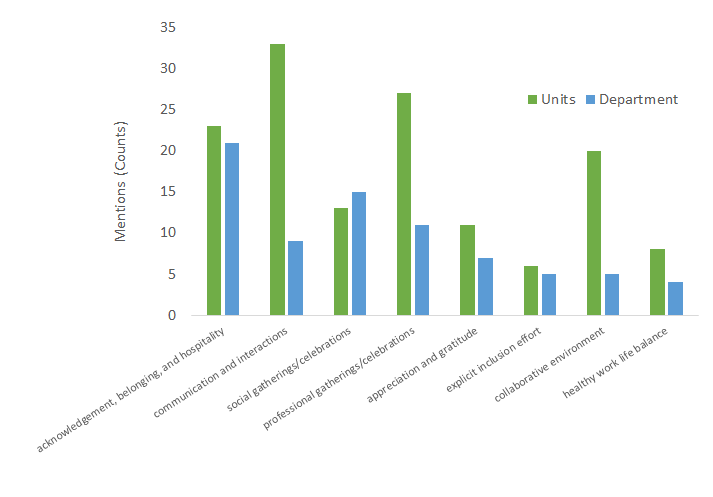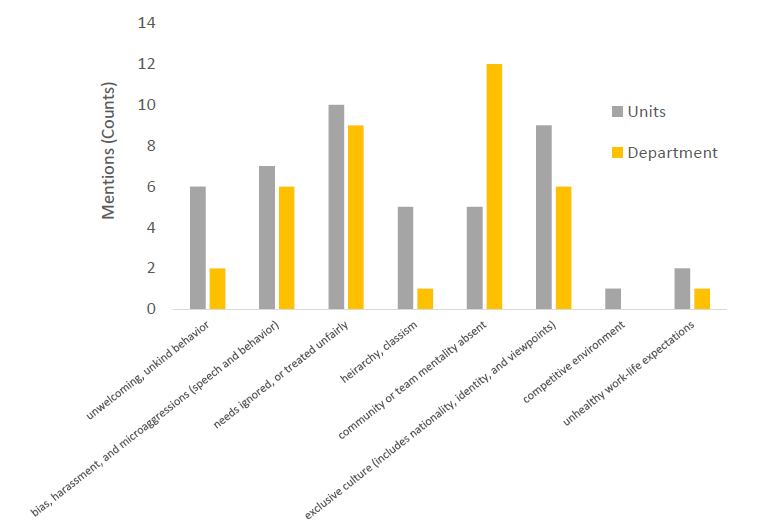|
written by: Demian Nunez and Mike Nan On October 29th, the UMD Entomology Department’s weekly colloquium was unique. Rather than listen to a speaker from outside the department, Dr. Anahi Espindola presented the survey results of the Diversity, Equity, and Inclusion (DEI) Committee’s department survey. The survey was developed to assess the internal atmosphere in the department, identify positive experiences and actions happening, assess what negative features needed to be addressed, and define actions to be taken to improve the department for all its members. The societal events that unfolded in 2020 and 2021 shed light on the lingering issues of inequality in the workplace. Academia and Entomology are not historically diverse. Weissmann et al. 2019 suggests that inadequate racial, ethnic, and gender diversity in Entomology persist because strategies used to promote DEI are flawed. The currently employed academic framework promotes individual effort, including inflexible deadlines, stereotypes, and assumptions that students learn at the same pace and method (Weissmann et al. 2019; Harrison-Bernard et al. 2020). To improve DEI, especially pertaining to women and minorities, a cultural change is needed in the academic framework as well as building on the diverse cultural assets of all department members. Improving DEI is essential to meet the goals of the department’s diversity statement and overcoming organizational obstacles that result in inequities. To improve DEI in the workplace, the departmental committee was formed in 2020 amid a surge in political unrest that raised our awareness of our society’s continuing inequities. The committee created an anonymous survey with one multiple choice and 10 open-ended questions for current department members and those who left the department in the last five years to voice their positive and negative experiences lived in department and provide a perspective in relation to their personal identities (e.g., based on self-descriptions of aspects of their identities). 59 out of 71 respondents were current department members. The use of open-ended, write-in answers rather than multiple choice selection necessitated quantitative text mining and other methods to interpret the responses. There was a wide variety of feedback, and although it was occasionally contradictory, several clear trends emerged in the data. Overall, positive responses outnumbered negative responses. The positive practices identified focused on interpersonal and community issues. The disparity in positive practices between the department and unit (e.g., labs, admin) level was strongest in the categories: “communications and interactions,” “collaborative environment,” and “professional gatherings/celebrations”. Other positive practices were more evenly represented between the department and unit levels, but the units still tended to have a slight edge (Figure 1). Most negative practices were reported at higher rates at the unit level than the department level as well, including issues of “unwelcoming behavior,” and “hierarchy/classism.” One major exception was “absence of a community or team mentality,” which was more prevalent at the departmental level. Issues of “bias, harassment, and microaggressions,” “ignored needs, or treated unfairly,” and “unhealthy work-life expectations” were more evenly shared across both levels, and mention of a “competitive environment” only received one mention at the unit level (Figure 2). These results reveal the range of personal experiences in the entomology department. While many members of the department do experience a strong sense of community, this is not something that everyone is able to participate in equally. The themes of unwelcoming behavior, hierarchy, classism, and cultural exclusion could suggest that individuals’ experiences could be tied to aspects of their identities. The committee asked respondents to describe aspects of their identity that came to mind when answering questions regarding experiences in the units and the department.
Respondents most often identified with their gender, age, position, and race or ethnicity when answering the questions, however, nationality, socioeconomic status, and sexual orientation were all mentioned several times, and were all most prevalent thinking about practices at the lab level rather than the department. To analyze potential structure between self-reported identities and respondents’ responses about positive and negative practices, the committee tested for nestedness and specialization in the responses. Nestedness reveals how different word choices are used across identity categories. The “specialization” metric measured whether the word choices of respondents in each identity category were unique. Low values would be expected if identity category had no effect on word choices or answer categories. Using only word choice, the specialization analysis didn’t reveal large variations in the answers between identities. However, when comparing categories of answers given by different identities, there was a marked difference, especially regarding negative questions, indicating a relationship between identity category and negative experiences. To build a department and lab groups that are more inclusive and welcoming requires an active effort and existing issues need to be acknowledged and addressed. This Departmental survey was a necessary step toward understanding the experiences of our community and identifying what we are doing right and where we must improve. In the DEI committee’s official report, they provided additional analysis and suggested changes. The final two questions on the DEI survey referenced the Department of Entomology’s diversity statement and spawned the creation of the department’s updated long and short form diversity statements. In light of the DEI committee’s efforts and the dialogue after the discussion, the Entomology Department can continue the work of better embodying the values and vision expressed in its Diversity Statement and become a better and more welcoming environment for every one of its members. References:
Demian Nunez is a MS student in the Cerruti Hooks lab studying IPM practices employing living mulch in Cantaloupe Mike Nan is a PhD student in the St. Leger Lab studying how circadian rhythms affect Metarhizium infection of Drosophila. Comments are closed.
|
Categories
All
Archives
June 2024
|
Department of Entomology
University of Maryland
4112 Plant Sciences Building
College Park, MD 20742-4454
USA
Telephone: 301.405.3911
Fax: 301.314.9290
University of Maryland
4112 Plant Sciences Building
College Park, MD 20742-4454
USA
Telephone: 301.405.3911
Fax: 301.314.9290



 RSS Feed
RSS Feed




